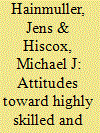| Srl | Item |
| 1 |
ID:
099283


|
|
|
|
|
| Publication |
2010.
|
| Summary/Abstract |
Past research has emphasized two critical economic concerns that appear to generate anti-immigrant sentiment among native citizens: concerns about labor market competition and concerns about the fiscal burden on public services. We provide direct tests of both models of attitude formation using an original survey experiment embedded in a nationwide U.S. survey. The labor market competition model predicts that natives will be most opposed to immigrants who have skill levels similar to their own. We find instead that both low-skilled and highly skilled natives strongly prefer highly skilled immigrants over low-skilled immigrants, and this preference is not decreasing in natives' skill levels. The fiscal burden model anticipates that rich natives oppose low-skilled immigration more than poor natives, and that this gap is larger in states with greater fiscal exposure (in terms of immigrant access to public services). We find instead that rich and poor natives are equally opposed to low-skilled immigration in general. In states with high fiscal exposure, poor (rich) natives are more (less) opposed to low-skilled immigration than they are elsewhere. This indicates that concerns among poor natives about constraints on welfare benefits as a result of immigration are more relevant than concerns among the rich about increased taxes. Overall the results suggest that economic self-interest, at least as currently theorized, does not explain voter attitudes toward immigration. The results are consistent with alternative arguments emphasizing noneconomic concerns associated with ethnocentrism or sociotropic considerations about how the local economy as a whole may be affected by immigration.
|
|
|
|
|
|
|
|
|
|
|
|
|
|
|
|
| 2 |
ID:
052509


|
|
|
|
|
| Publication |
2003.
|
| Summary/Abstract |
Hitherto, political science has failed to answer a rather simple question: Why do some states provide high levels of airport security, while others fail to do so? Drawing upon a rational choice institutionalist framework, we compare airport security regimes in the US and Europe (in particular Germany) and show that the performance gap before September 11 can be largely attributed to institutional factors. In the US, responsibility was assigned to airlines, whose cost-cutting efforts resulted in lax controls. In Germany, the government shielded the provision of airport security from market pressures. We claim that delegation of responsibility for airport security to the government is a necessary, yet not a sufficient condition for a high security performance. Systems in which responsibility lies with private airlines are doomed to fail, since private markets are ill-equipped to provide a high security performance. While airlines have a long-term interest in safeguarding civil aviation, there exists both a time inconsistency and a collective cost problem that prevents sufficient investment in security in the short run. Thus, US policy-makers are well advised to resist the growing pressures for re-privatization and cost-cutting as well as to eliminate remaining flaws in the current federalized system.
|
|
|
|
|
|
|
|
|
|
|
|
|
|
|
|